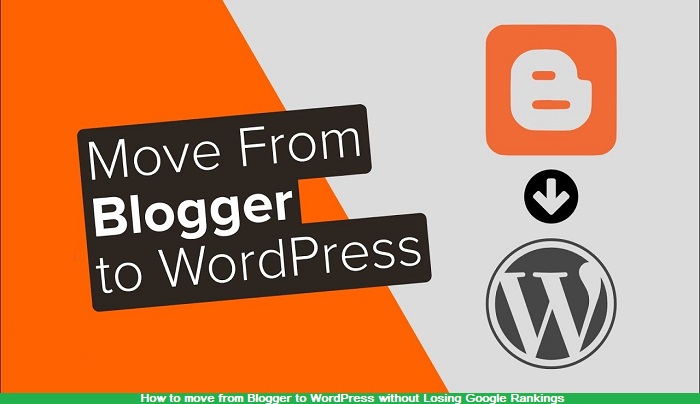Are you wondering about how to move from Blogger to WordPress without losing Google ranking? There is nothing wrong with your intent because many people are doing it every day. Since the introduction of WordPress, there has been a massive migration from blogger, people suddenly prefer to use WordPress for blogging and building website. If you have been blogging for sometimes now, you may be already generating traffic to your website and have been gradually moving up Google ranking. If you are positioned in the first 5 search results of your keyword, it’s understandable that you are concerned about losing your Google ranking.
Therefore, if you are desirous about changing from the blogger platform to WordPress without losing your ranking on Google, there are some steps you must follow.
Blogger:
Blogger is the first option for a beginner who decides to blog because it’s free and easy to use. The content management platform is operated and owned by Google. Setting up is quite easy, just a few clicks and you are ready to go. Also, don’t forget that it’s free. Although this article is poised at guiding you about migrating from Blogger to WordPress, it does not in any way indicate that using blogger is not ideal for blogging, just take it as a guide.
Also read: The Truth About Shared WordPress Web Hosting
Blogger is for beginners that are just testing the waters, but for advanced online business people that have outgrown blogger and desire to dive deeper into an online business, WordPress is the perfect choice for you. Why?
Reasons for moving to WordPress:
WordPress affords you the opportunity to self-host hence puts you in control of your business. With WP software, you will have ownership of your domain, website, and the entire content. The things you can perform are virtually unlimited. There are thousands of free and paid plugins available for use. Using a self-hosted WP website is customizable and you can access greater benefits like unlimited bandwidth, support, and storage when the site is hosted by a reputable company.
Moving blogger to WordPress:
Under perfect circumstances, transferring from blogger to WP can be done with a click of a button and cha-ching, you are done. Unfortunately, this is not so because the process is kind of techy, requiring a little know-how. Besides, it’s not possible to migrate your entire website as it is on blogger.
Below are contents that you can easily transfer:
Comments
Pages and posts
Categories
Permalinks
Media
Authors
Feeds
Traffic
First step:
Look for the best web hosting provider, and select one. You can either go for shared hosting, VPS or dedicated server. It’s your choice, but, if you are a beginner, go for shared hosting because it’s cheaper. Ignore the shared hosting option if you are an established business that simply needs a business upgrade.
There are thousands of hosting deals you can choose from, but ensure you go for the one with the best online reputation.
Second step:
Once you have chosen your plan, the next step is to install WordPress. Here is how to go about it. Note that this process of installing WordPress differs from one hosting provider to another. In this article, the Bluehost installation guide is used for explanation purposes. Although the installation process is different in various providers, the basics are the same. As far as installation goes, you won’t get lost because most of the reputable hosting providers offer an easy installation guide.
Also read: Things you should know before choosing a web hosting company
So, using Bluehost log in to your Bluehost cPanel, you can click on a WordPress installation.
Select the domain you wish to install into, next to the field there is an option to select a subfolder.
Next is to choose advance options, and press the install now button.
Third step:
Ones your WordPress installation is successful, the next step is to export or transfer your blog contents.
*Go to blogger and sign in to your account
*Locate setting and click on it, the “other”
*You will be lead to the settings page, and right on top of the page, locate the backup and import section.
*Click the backup content, a pop-up window will appear, then press saves on your system.
After you have pressed the button, downloading of MZL file will begin which has the entire vital data of your blog. The file could be large or small, but that depends on the quantity of your content.
Next is to find the file and you are done with the transfer.
Fourth step:
Import your data to WP: In case you haven’t jumped this guide, you should have your hosting account by now, and have already set up your site on WordPress. So, import from blogger to WP.
*Go to your dashboard, log in to your WP site
*Locate your tools and click on import.
*Look for blogger on the rundown list and click the install now button, wait for WP to install the plugin.
*Once the installation is completed, WP will display a notification informing you if it was successfully installed.
*To import, just click run importer, and on the new page select file button. Look for the XML file that you downloaded to your desktop and press the upload file to import.
Allocate author
In case you have many posts in your blogger, recognizing it might be hard if they are not changed. This is a fact if you are importing to an already running site. To assist you with the process, WP enables you to reallocate the author of the site you imported to an available user on the website.
Also read: Here are 6 Best Web Hosting for small business
If the website is a new one, you probably have only one user that you created in the process of installation. Therefore, you have the option to select a name for the list, plus the content, so the content will be transferred to the user automatically.
The information provided is a detailed process that you can follow to transfer your Blogger content to your WordPress without losing your Google ranking. Whichever hosting account you choose, ensure they are reputable; you will have a full guide and support to assist you in the process. It’s not difficult, so start now.












Add Comment